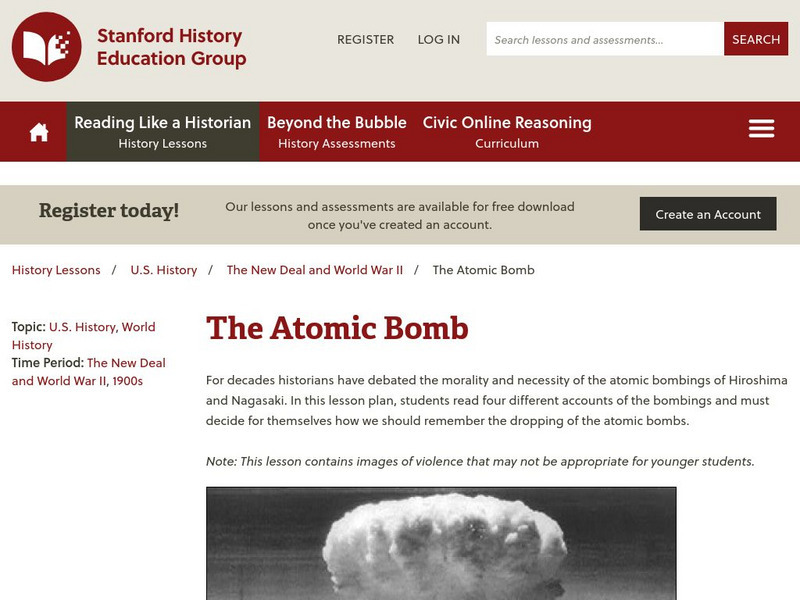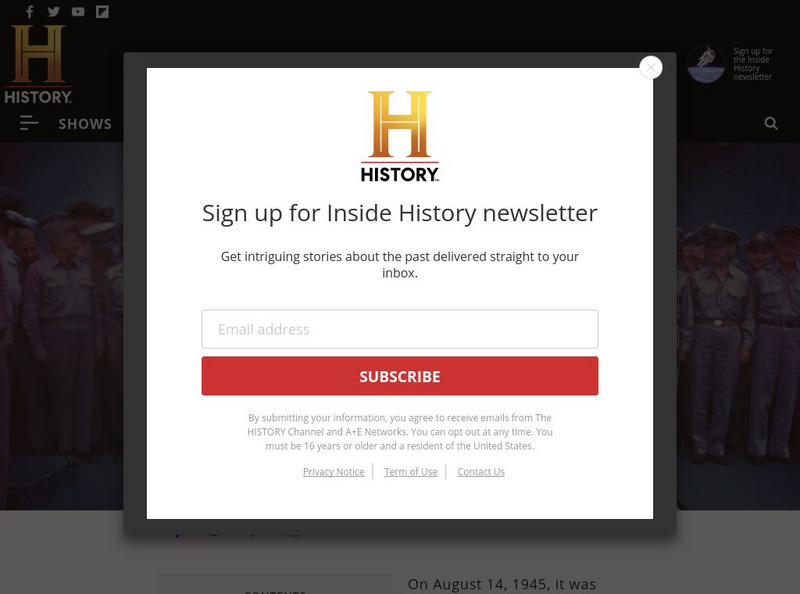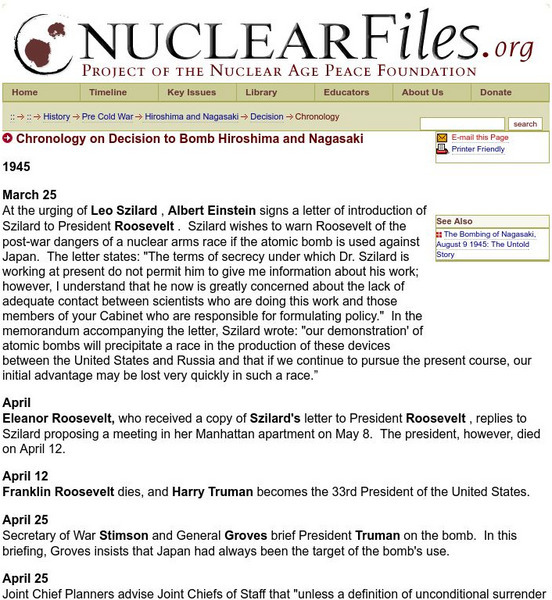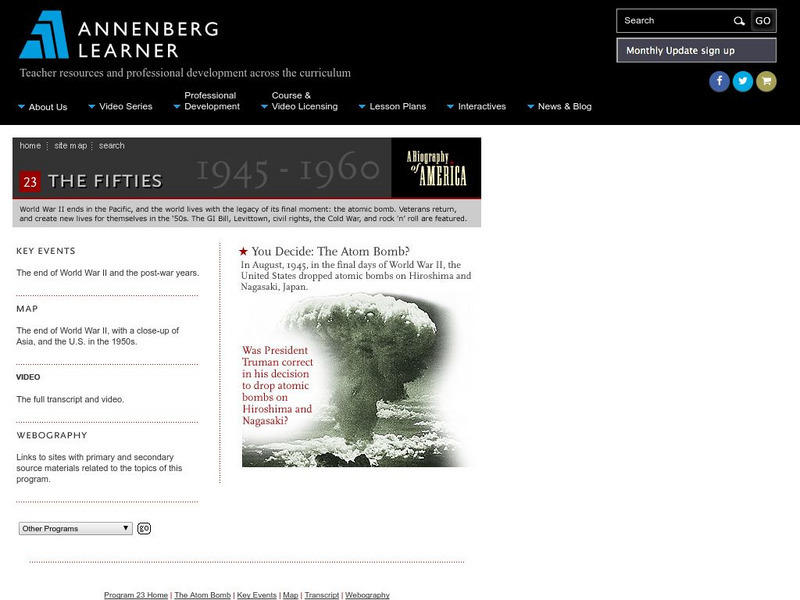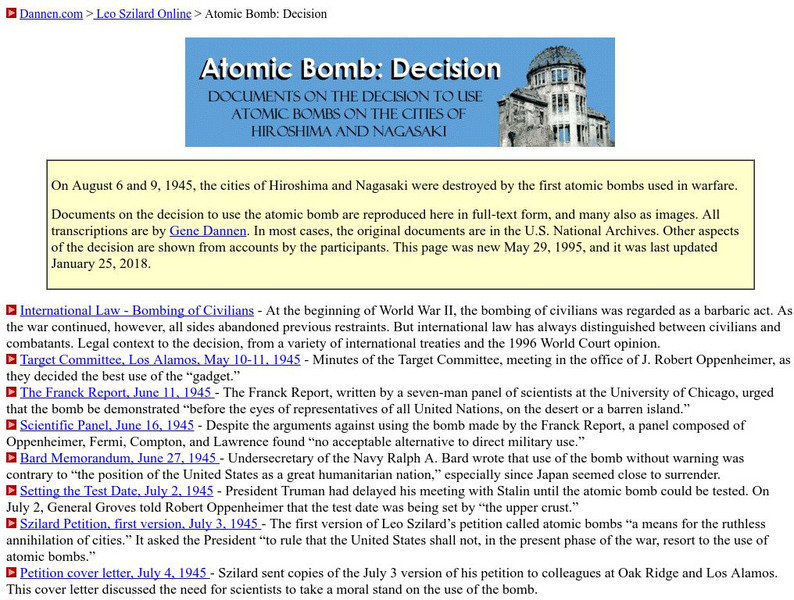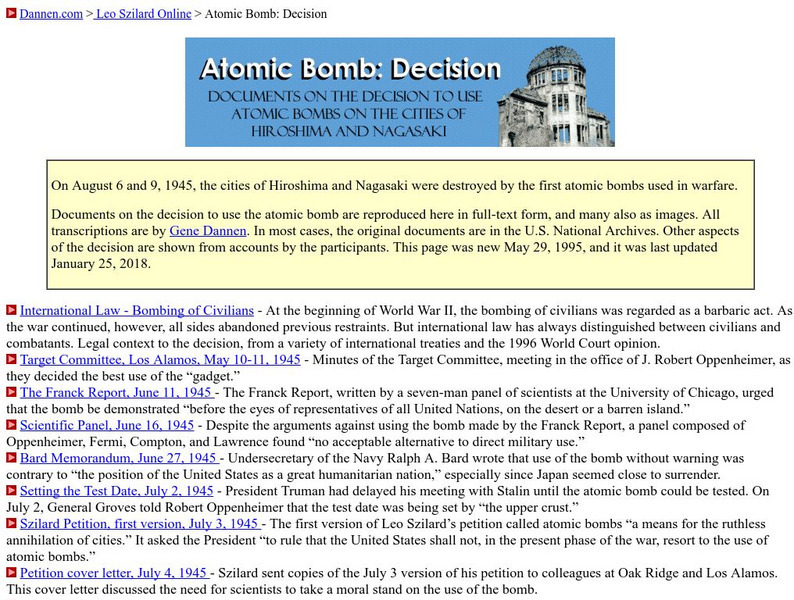OpenStax
Open Stax: World War Ii 1941 1945: The Pacific Theater and the Atomic Bomb
Looks at America's involvement in the Pacific Campaign, and the decision to use the atomic bomb against Japan and the impact it had.
Harry S. Truman Library and Museum
Harry S. Truman Library & Museum
Everything you wanted to know and more about Harry S. Truman, from biographical information to love letters.
Stanford University
Sheg: Document Based History: Reading Like a Historian: The Atomic Bomb
[Free Registration/Login Required] How necessary was it for the United States to drop the atomic bombs on Nagasaki and Hiroshima in World War II? In this lesson, students will study varying accounts and develop their own opinions of...
A&E Television
History.com: Vj Day: Victory Over Japan Day
Comprehensive discussion of V-J Day or the day victory was declared in Japan. Includes details and facts about World War II and the war in the Pacific, the surrender, related photos and speeches, battle maps, and more.
Other
Nagasaki University: Medical Effects of the Atomic Bomb at Nagasaki
This resource provides data about the physical destruction of Nagasaki, the medical aspect, and survivor stories.
Yale University
Yale Avalon Project: Radiation Injuries in Japan
Site from Yale provides detailed information about the radiation sickness that swept through the bombed areas of Japan after WWII. Detailed and thorough analysis.
Other
Los Alamos National Laboratory
The official website of the Los Alamos National Laboratory. You will find the history of the laboratory as well as many of the key figures. There is also an interactive history of the Manhattan Project. Be sure to check out the photo...
Ohio State University
Osu History Teaching Institute: The Manhattan Project
Students will discuss the role of technology of the atomic bomb and explore the destruction of Nagasaki and Hiroshima during WWII. Students will then outline some of the social and political changes that resulted from the Manhattan Project.
Exploratorium
Exploratorium: The Memory Exhibition
Students investigate the Memory exhibition that was at the Exploratorium. Some topics examined are the anatomy of memory, Nagasaki, and Franco Magnani. The resource consists of exhibition news, online exhibits, articles, and lectures.
Digital History
Digital History: The Aftermath of the Decision [Pdf]
A touching and horrifying description of the devastation caused by the dropping of atomic bombs on Hiroshima and Nagasaki, which brought about the surrender of Japan in World War II. Suggested student exercises accompany the information....
Lonely Planet
Lonely Planet: Japan
Lonely Planet provides an overview of Japan's history. Also includes information about Japan's culture, geography, demographics, and more.
World Wide School
World Wide School: Chapter Iii: Summary of Damages and Injuries
This page details the damages and injuries caused by the Hiroshima and Nagasaki atomic bombs. The information comes from Chapter 3 of the book The Atomic Bombings of Hiroshima and Nagasaki by The Manhattan Engineer District, published in...
National Cable Satellite Corporation
C Span Classroom: World War Ii the Decision to Use the Atomic Bomb
This video provides Lt. Col. Grant Weller, who describes the decision of the United States to use the atomic bomb on Japan to end World War II. Student questions are provided to assess their understanding of the information.
Raleigh Charter High School
Mrs. Newmark's Page: World War Ii Chronology 3
This activity has you put events of the end of World War II in chronological order.
Other
Nuclearfiles.org: Chronology on Decision to Bomb
This detailed chronology of the events and communication of 1945-1946 shows Truman's role in the process of the decision to drop the world's first atomic bomb used in warfare upon Hiroshima and then the second upon Nagasaki. Also...
University of California
University of California, Los Angeles: Children of the Atomic Bomb
In his own words, an American physician describes the devastating effects of the atomic bomb dropped in Nagasaki during World War II. Included is an online collection of images of the aftermath, videos, lesson plans, oral history...
Raleigh Charter High School
Mrs. Newmark's Page: Winning the War (1944 1945)
This quiz focuses the ending of WWII.
Annenberg Foundation
Annenberg Learner: A Biography of America: The Fifties 1945 1960
World War II ends with the legacy of its final moment: the atomic bomb. After reading comprehensive background material, interactive feature lets you decide if President Truman was correct in his decision to drop atomic bombs on...
Other
Dannen.com: Atomic Bomb Decision
This site has information about the bombings of Nagasaki and Hiroshima. The information is detailed and in depth. Contains many links to related sites.
Other
Atomic Bomb: Decision
An indexing page which links to several pages of letters, diary excerpts, public reports, and personal correspondence relating to the use of the first atomic bomb. Includes letters and petitions drafted by scientists involved with the...
Independence Hall Association
U.s. History: The Decision to Drop the Bomb
Was it necessary to drop the atomic bomb on Japan in order to save lives? Were the consequences worse than the waiting for a surrender of Japan? Read this discussion of the decision to drop the bomb, find out about the possible motives...
Science Struck
Science Struck: History of the Atomic Bomb
Describes the history of the invention of the atomic bomb, its use in World War II against Japan, the impact on people who were targetted by it, the immediate and long-term impact on generations of people, the effect on communications,...
Science Struck
Science Struck: Atomic Bomb Facts
Discusses lost nuclear weapons, the power of an atomic bomb, the bombing of Hiroshima and Nagasaki, the development of the atomic bomb, the making of the hydrogen bomb, the detonation of a hydrogen bomb by Russia in 1961, and the status...
Khan Academy
Khan Academy: Gallery: The Modern World
Innovations in transportation, communication, and weapons transformed the world in the 20th century. The modern era is the most complex yet, and the most fragile. This photo gallery highlights some of these innovations.




